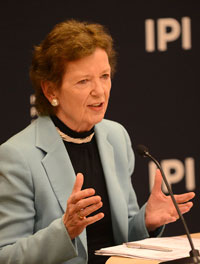
To implement the new “Framework of Hope” signed by eleven member states from arguably the most troubled region of Africa requires the involvement of a wide cross-section of the population in each of the signatory countries, said Mary Robinson, Special Envoy of the Secretary-General to the Great Lakes region in Africa.
“It’s they who will benefit if the framework is implemented fully, so they should be active in encouraging each of their governments to make special efforts to ensure full implementation,” she said. “And they should be ready to hold their governments accountable for any failure to respond adequately.”
Ms. Robinson said women in the Great Lakes region are not just living in poverty, but in fear. “They can’t walk the streets. They say it doesn’t matter which armed group it is—or regular army, very often—they’ve had terrible problems of rape and re-rape, of displacement.”
About the framework, Ms. Robinson said there are signs that the member states really want it to work.
“I want to continue this dialogue, I want to continue to share the benchmarks at regional levels and the benchmarks at national levels,” she said. “This is for you—I think that’s the message we have to get across.”
The interview was conducted by Marie O’Reilly, associate editor at the International Peace Institute.
Listen to interview (or download mp3):
Transcript
Marie O’Reilly: I’m here today with Mary Robinson, Special Envoy of the Secretary-General to the Great Lakes region in Africa. Mary, thank you so much for speaking with us on the Global Observatory today.
Mary Robinson: It’s a pleasure.
MOR: Mary, in your role, you have been heavily involved in listening and speaking with members of civil society, and in particular women, across the Great Lakes region. How are you feeding that into the broader peace process?
MR: It’s very important to try to make this a framework that people see as a framework of hope. It’s for them. It’s the Peace, Security and Cooperation Framework for the Democratic Republic of Congo and the region—and the region actually is a big region, because eleven member states have signed this framework. And they are committed to regional commitments and national commitments, and they have created mechanisms of oversight. And four institutions are guarantors that this will be implemented: the United Nations, the African Union, the Conference of the Great Lakes, and SADC [the Southern African Development Community]. I think that is a sign that this time, people really want it to work.
MOR: When you speak to women in the region, what do they tell you? What are their priorities?
MR: They have so many priorities, very basic priorities. They live not just in poverty, but in fear. They can’t walk the streets. They say it doesn’t matter which armed group it is—or regular army, very often—that they’ve had terrible problems of rape and re-rape, of displacement. The numbers of refugees going across borders—60,000 very recently going across the border into Uganda. The lack of normal life, normal healthcare, normal schools for children, possibilities of having food, even. They are very, very basic issues.
MOR: I wonder if you could speak a little bit more about the framework. When you first took up your new role, you sort of adjusted the name of the framework, turning, the “peace, security and cooperation” framework into a Framework of Hope. Why did you do that?
MR: The framework is very important because it has been signed by so many heads of state and guaranteed by the four key institutions. But for me it’s about the people of those countries, it’s for them. And I wanted to make it accessible to them by saying, you know, It’s important that it’s not only governments but a wide cross-section of the population in each country—parliamentarians, women’s groups, human rights organizations, young people, business groups, trade unions, faith-based organizations, academics, and others—know the details of this Framework of Hope. It’s they who will benefit if the framework is implemented fully, so they should be active in encouraging each of their governments to make special efforts to ensure full implementation. And they should be ready to hold their governments accountable for any failure to respond adequately.
So, I want to continue this dialogue, I want to continue to share the benchmarks at the regional level and the benchmarks at national levels. So, you hold your government accountable now; this is for you—I think that’s the message we have to get across.
MOR: The word “hope” also featured in a poem by Seamus Heaney that you quoted in your framework. I wonder if you’d share the first stanza with us now?
MR: I thought it was so appropriate and Seamus was, as always, very generous, and said “of course.”
——————
History says, don’t hope
on this side of the grave.
But then, once in a lifetime
the longed for tidal wave
of justice can rise up
and hope and history rhyme.
——————
MOR: Mary, thank you very much for sharing your insights with us today.
MR: It’s a pleasure, thank you.




